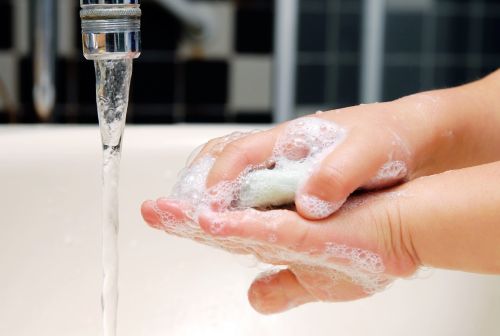Menu
Close
Back
Welcome to
Together is a new resource for anyone affected by pediatric cancer - patients and their parents, family members, and friends.
Learn MoreChildren with serious illnesses can be at high risk for infection.
Certain illnesses and treatments such as chemotherapy can weaken your child’s immune system. A person with a weak immune system is known as immunocompromised. They are at a higher risk for infections.
If your child’s immune system is weak, viruses such as COVID-19, the flu, and RSV can be more serious than they would be in a healthy child.

Washing your hands often is one of the most important steps you can take to prevent infection.
If your child has a weak immune system, it is important to take steps to prevent a worsening illness. Talk to your child’s doctor about your child’s risk for infection.
Ensure that your child and their environment are clean to help prevent infections. The best way to prevent infection is to clean your hands often. Clean your hands with soap and water or use an alcohol-based hand sanitizer.
Self-care is important to prevent infection. This includes:
Limit travel, avoid crowds, wear face masks in public places, and limit contact with people outside of your household.
Even dust and dirt can have harmful germs for children who have weak immune systems. Basic cleaning of floors and surface areas can help reduce risk of infection.
Give special attention to any places where your child goes for medical care. Toys and other objects that children use can carry germs. Wipe down toys and electronics regularly.
Wash soft toys, blankets, and linens in hot water. Change bed sheets and linens often.
Infectious disease expert Hana Hakim, MD, MS, explains the importance of getting the flu vaccine for children with serious illness and their families.
Things you might not usually think of can be a source of infection for children with weak immune systems. Talk to your medical team about these possible risks:
Wash hands before preparing and eating foods. Keep food preparation areas clean. Store and cook food properly. Wash fruits and vegetables before eating.
Talk to your doctor about foods to avoid and follow dietary instructions.
Chemotherapy, radiation therapy, or infection can cause diarrhea. Wash hands with soap and water and disinfect surfaces. Wear disposable gloves when changing diapers.
Call your child’s care team if your child has been exposed to a virus or has symptoms of an illness such as:
Every parent of a child with cancer or another serious disease should know the signs and symptoms of a sepsis infection.
Warning signs of severe illness are:
Know what to do if symptoms develop. Call ahead before going to the doctor except in an emergency. Make sure you have extra medicines and medical supplies.
Do not delay medical visits unless your doctor says to do so.
If you have questions about your child’s health or about vaccines, talk with your child’s care team. They are the best source of guidance to help you manage your child’s health.
—
Reviewed: November 2023